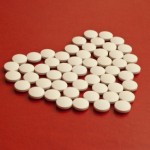I get tons of comments that come from for=profit websites or email addresses that bounce.
But last month I received one that made sense, asked for links to medical sites and got those in a subsequent email.
Thanks, Rosey.
Peter
Hi Peter,so far these are the papers I've found on the subject of withdrawing from aspirin:http://www.ncbi.nlm.nih.gov/pubmed/16087761
and I've cut&pasted a quote below from"There appears to be a rebound from reversing the “blood thinning” effects of aspirin when it is stopped suddenly. Over three times the expected risk of stroke occurs in patients with a previous history of heart disease when they suddenly stop taking aspirin.13 A similar increase in risk of heart attack has been reported when aspirin was stopped.
No one has determined a safe regime for discontinuing this therapy. I suggest that people needing to stop long-term use of aspirin should do so slowly. Since as little as 30 mg (1/3 of a baby aspirin) will deactivate all of the body’s platelets, slow withdrawal should begin at about this level. Cut a baby aspirin into quarters (now 20 mg). Take 20 mg then wait for 4 days to take the next 20 mg dose. Increase the interval between 20 mg doses by one day until a 10-day interval between doses is reached, and then stop taking the aspirin. This is not an easy task since the tablets are so small. Reduction or discontinuation should be done after obtaining a doctor’s advice on the risks and benefits for each individual patient. Even before reducing the aspirin, patients should change to the McDougall Diet in order to most effectively reduce their risk of strokes and heart attacks."
"13) Maulaz AB, Bezerra DC, Michel P, Bogousslavsky J.† Effect of discontinuing aspirin therapy on the risk of brain ischemic stroke.† Arch Neurol. 2005 Aug;62(8):1217-20."
(This reference is the first link above)
I haven't been able to find any other advice from doctors and scientists on how to safely get off aspirin without these risks.Thanks for your interest,Rosemary Faire



